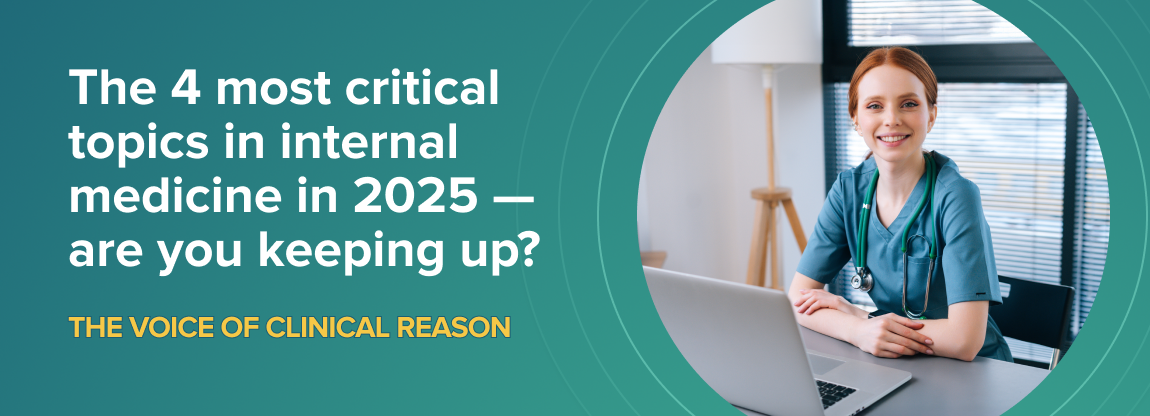The 4 most critical topics in internal medicine in 2025 — are you keeping up?
Internal medicine is evolving faster than ever, and staying ahead isn’t just about keeping up with the latest research — it’s about ensuring the best possible outcomes for patients. With new challenges, innovations, and expectations shaping modern practice, these four topics are defining the landscape of internal medicine in 2025. Are you ready?
1. The resurgence of the physical exam — why it still matters
As imaging and lab-based diagnostics advance, the necessity of the physical exam is increasingly questioned. Yet, its power remains irreplaceable. While technology enhances disease assessment, over-reliance on it risks diminishing essential clinical skills and eroding patient trust. Mastering refined examination techniques not only improves diagnostic accuracy and reduces unnecessary testing but also preserves the human connection at the heart of medical care — an aspect many feel is being lost in modern medicine.
Historically, the physical exam was the first and only tool physicians had to understand the human body. The art of percussion, for example, was pioneered by Leopold Auenbrugger in 1761, drawing inspiration from his father’s ability to gauge the fullness of a wine barrel by tapping on it. Such bedside techniques were the “ultrasound” of their day — providing critical diagnostic information without the need for expensive or invasive tests.
Now, as healthcare costs soar and system-wide efficiency pressures mount, there is a growing movement to reclaim the value of the physical exam. Beyond its diagnostic power, a skillfully-performed exam strengthens physician-patient relationships, builds trust, and reduces unnecessary testing. Mastering this skill is more than a nod to tradition — it’s a critical competency for the modern clinician in an era of depersonalized medicine.


Harrison’s 22nd edition explores this in detail with an updated chapter on the value of the physical exam in modern medicine. This chapter is available in full for a limited time – read it now.
2. Physician well-being — the silent crisis we can no longer ignore


Burnout and mental health challenges among physicians have reached critical levels, impacting both personal well-being and patient care. Addressing this is a professional imperative. New strategies for mitigating stress, developing resilience, and creating sustainable work environments are now at the forefront of medical education and leadership.
The practice of medicine has long been viewed as a calling — one that demands sacrifice, resilience, and unwavering commitment. From the early days of live-in residency programs established by Dr. William Osler to the grueling 100-hour work weeks of the 20th century, the medical profession has prioritized professional excellence over personal well-being. For decades, physician fatigue, burnout, and mental health challenges were overlooked — even as evidence mounted that they directly impact patient safety, medical errors, and career longevity.
It wasn’t until tragic events, such as the 1984 death of Libby Zion, linked to overworked and unsupervised residents that duty-hour restrictions began to take shape. Yet, while work hours have been regulated, the broader culture of medicine still struggles to address physician well-being in a meaningful way. The COVID-19 pandemic further exacerbated stress, pushing many physicians to their breaking point.
Now, the conversation has shifted from individual responsibility to systemic change — recognizing that physician well-being is not just about personal resilience but about reforming medical training, improving institutional support, and creating sustainable careers in medicine. Understanding the history of physician burnout and the latest evidence-based strategies for prevention and intervention is critical for the future of the profession.
Recognizing the urgency of this issue, Harrison’s 22nd edition introduces a brand new chapter on physician well-being which is free for AccessMedicine members to read here.
3. Technology at the bedside — AI and ultrasound in modern diagnosis
Advancements in technology are reshaping the way physicians assess, diagnose, and treat patients. Two innovations in particular — point-of-care ultrasound (POCUS) and artificial intelligence (AI)—are redefining bedside medicine, improving both speed and accuracy in clinical decision-making.
POCUS, a cornerstone of next-generation bedside assessment: Once a niche skill, POCUS is now an essential extension of the modern physical exam. From rapid cardiac assessments to guiding procedures with precision, real-time ultrasound is transforming patient care. Understanding its applications and limitations is now essential, not optional.
AI in diagnosis and decision support: AI-driven tools are streamlining workflows, identifying patterns in complex data, and assisting with clinical decision-making. From machine learning algorithms flagging early disease markers in imaging scans to predictive models optimizing treatment plans, AI is already embedded in modern practice. However, its integration raises critical questions: How do clinicians balance AI-generated recommendations with clinical judgment? What safeguards are needed to ensure ethical use? Understanding the evolving role of AI in medicine is essential — not as a replacement for physician expertise, but as a tool to enhance it.


Together, POCUS and AI exemplify the rapid technological shift in internal medicine. Those who embrace these advancements will not only improve diagnostic accuracy but also enhance patient outcomes and efficiency in practice.
An updated chapter on Machine Learning and Augmented Intelligence in Clinical Medicine will be available soon on AccessMedicine.
4. The new era of immunization — science, misinformation, and the crisis of trust


Vaccination strategies have taken center stage in public health, but immunization now extends beyond routine protocols. Advances in mRNA technology, evolving vaccine schedules, and the push for personalized immunization approaches mean that what you knew five years ago may no longer apply. The latest updates in immunization science are crucial for every practicing clinician.
Vaccines have been one of the greatest public health achievements of modern medicine, drastically reducing morbidity and mortality from infectious diseases. However, the success of immunization programs is now threatened by a growing crisis of confidence. Vaccine hesitancy — fueled by misinformation, pseudoscience, past safety concerns, and deep-seated distrust in institutions — has led to declining vaccine uptake and the resurgence of vaccine-preventable diseases.
The pandemic amplified these challenges, accelerating the spread of misinformation and further eroding public trust in vaccines, healthcare providers, and public health systems. As a result, clinicians are on the frontlines of this battle — not only administering vaccines but also navigating complex patient concerns, debunking myths, and rebuilding trust in science-based medicine.
Understanding why patients are hesitant and how to effectively counsel them is now an essential skill for every healthcare provider. Studies show that a clear, strong recommendation from a trusted physician is one of the most effective tools in changing minds. The latest research and clinical strategies for addressing vaccine hesitancy — including how to communicate with skeptical patients — are critical components of modern immunization practice.
Updates have been made to the vaccine opposition and hesitancy chapter, addressing these challenges and offering practical strategies. Preview the chapter here.
Stay ahead with Harrison’s
Internal medicine isn’t standing still, and neither should you. The 22nd edition of Harrison’s Principles of Internal Medicine is your definitive resource for navigating these challenges and innovations. Stay informed, stay prepared, and most importantly — stay ahead.
The four topics we’ve covered are just a glimpse of the landscape-shifting advances in internal medicine — but the reality is, modern clinical practice demands mastery of so much more. The new edition of Harrison’s is not just an update — it’s an indispensable resource, meticulously revised with 20% new content, 10+ brand-new chapters, and the latest evidence-based advancements across every specialty.
From the latest breakthroughs in AI-driven diagnostics to emerging therapies in oncology, cardiology, and infectious diseases, Harrison’s defines the knowledge every clinician needs to deliver the highest standard of care for practicing physicians, medical educators, and institutions.
If staying ahead matters, if clinical excellence is the goal, then there is no alternative. Access everything. Master everything. Own the 22nd edition of Harrison’s.
Click here to explore the new edition with your AccessMedicine subscription, or to get a 14-day free trial.

